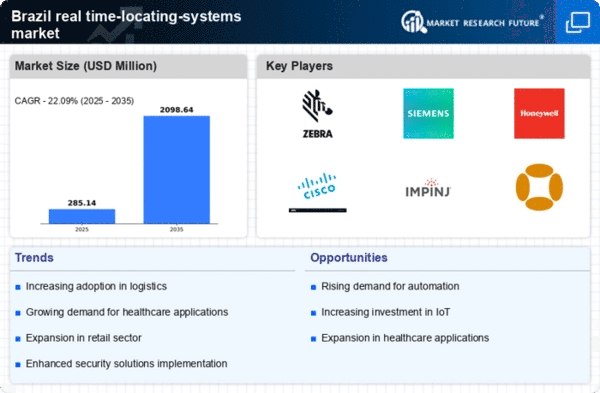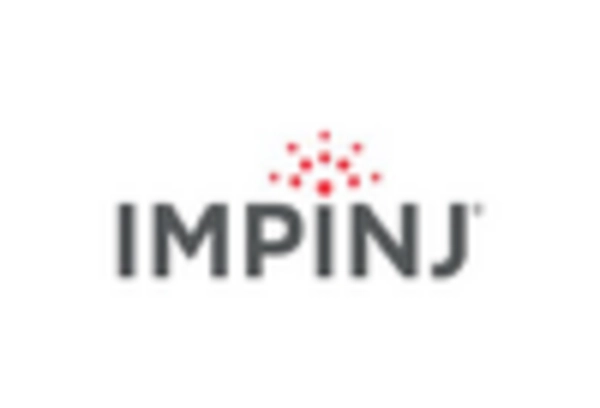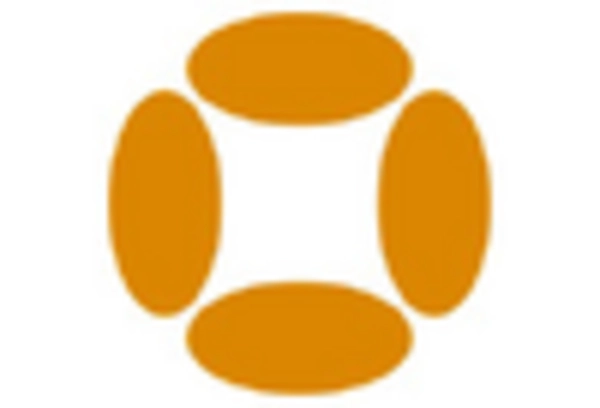Growing E-commerce Sector
The burgeoning e-commerce sector in Brazil is a significant driver for the real time-locating-systems market. As online shopping continues to gain traction, logistics and supply chain management have become increasingly complex. Retailers are seeking efficient solutions to manage inventory and ensure timely deliveries, which has led to a heightened demand for real time-locating-systems. In 2025, the e-commerce market in Brazil is projected to grow by 25%, further amplifying the need for effective tracking and locating solutions. This growth compels businesses to invest in technologies that provide real-time insights into inventory levels and shipment statuses. Consequently, the real time-locating-systems market is likely to expand as companies adapt to the evolving landscape of e-commerce, aiming to enhance customer satisfaction and operational efficiency.
Rising Demand for Asset Tracking
The real time-locating-systems market in Brazil experiences a notable surge in demand for asset tracking solutions across various sectors. Industries such as manufacturing, healthcare, and logistics are increasingly adopting these systems to enhance operational efficiency and reduce losses. In 2025, the asset tracking segment is projected to account for approximately 35% of the overall market share. This trend is driven by the need for real-time visibility of assets, which helps organizations optimize inventory management and improve service delivery. Furthermore, the Brazilian government has been promoting initiatives to digitize supply chains, further propelling the adoption of real time-locating-systems. As companies seek to leverage technology for competitive advantage, the demand for sophisticated tracking solutions is likely to continue its upward trajectory.
Technological Advancements in RTLS
Technological advancements are significantly influencing the real time-locating-systems market in Brazil. Innovations in wireless communication technologies, such as Bluetooth Low Energy (BLE) and Ultra-Wideband (UWB), are enhancing the accuracy and reliability of locating systems. These advancements enable businesses to implement more efficient tracking solutions, which are essential for sectors like retail and healthcare. In 2025, it is estimated that the integration of advanced technologies could lead to a 30% increase in the efficiency of real time-locating-systems. Moreover, the rise of artificial intelligence and machine learning is expected to further optimize these systems, allowing for predictive analytics and improved decision-making processes. As companies in Brazil strive to stay competitive, the adoption of cutting-edge technologies in real time-locating-systems is likely to accelerate.
Government Initiatives and Regulations
Government initiatives in Brazil play a crucial role in shaping the real time-locating-systems market. Regulatory frameworks aimed at enhancing safety and efficiency in transportation and logistics are being implemented. For instance, the Brazilian government has introduced policies that encourage the use of technology in public transportation systems, which is expected to drive the adoption of real time-locating-systems. These regulations not only promote safety but also aim to reduce traffic congestion and improve urban mobility. As a result, the market is likely to witness increased investments from both public and private sectors, fostering innovation and development in real time-locating technologies. The anticipated growth in government spending on infrastructure projects may further stimulate demand for these systems, potentially increasing market size by 20% over the next few years.
Increased Focus on Safety and Security
Safety and security concerns are increasingly influencing the real time-locating-systems market in Brazil. Organizations across various sectors are prioritizing the protection of assets and personnel, leading to a greater emphasis on real time monitoring solutions. Industries such as healthcare and manufacturing are particularly focused on ensuring the safety of their operations, which drives the demand for advanced locating systems. In 2025, it is anticipated that the market for safety-focused real time-locating-systems will grow by approximately 15%. This trend is further supported by the rising awareness of workplace safety regulations and the need for compliance. As companies strive to mitigate risks and enhance security measures, the adoption of real time-locating-systems is likely to become a standard practice in Brazil.
















